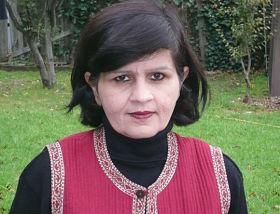41. Monima Chadha on Indian Philosophy of Mind
Monima Chadha takes Peter through Buddhist-Hindu debates over mind and self.
Themes:
• M. Chadha, “Time-Series of Ephemeral Impressions: The Abhidharma-Buddhist View of Conscious Experience,” Phenomenology and Cognitive Sciences: 14 (2015), 543-60.
• M. Chadha, ”The Problem of the Unity of Consciousness: A Buddhist Solution,” Philosophy East and West: 65 (2015), 746-64.
• M. Chadha, “On Knowing Universals: The Nyāya way,” Philosophy East and West 64 (2014), 287-303.
• M. Chadha, “A Buddhist Explanation of Episodic Memory: From Self to Mind,” Asian Philosophy: An International Journal of the Philosophical Traditions of the East 24 (2014), 14-27.
• M. Chadha, “Self in Early Nyāya: A Minimal Conclusion,” Asian Philosophy: An International Journal of the Philosophical Traditions of the East 23 (2013), 24-52.
• M. Chadha, “Self-awareness: Eliminating the Myth of the ‘Invisible Subject’,” Philosophy East and West 61 (2011), 453-67.
• M. Chadha, “Thinking Beings,” in A. Chatterjee (ed.) Philosophical and Scientific Perspectives on Consciousness (New Delhi: 2003).
• M. Chadha, “Are theoretical primitives basic objects?” in M. Chadha and A.K. Raina (eds), Basic Objects: Case Studies in Theoretical Primitives (Simla: 2002).
• M. Chadha, “Perceptual Cognition: A Nyaya-Kantian Approach,” Philosophy East and West 51 (2001), 197-209.







Comments
Hi Peter,
Hi Peter,
Do we have an episode plan for the upcoming buddhist+jain segment of hopwag?
Also, do you plan to cover the "saiva philosophy" (ie, abhinavagupta etc.), which is the following stage of hindu philosophy after the sutra age? www.iep.utm.edu/kashmiri
Thanks again for this jewel of podcasts..
In reply to Hi Peter, by mehmet
Upcoming
Yes, I'll be posting a list of the upcoming episodes in the next week or two. Actually the next episode is on rasa aesthetics so we will talk about Abhinavagupta in that one, but we won't get into Shaiva philosophy in this series apart from that since it is really after our chronological scope.
In reply to Upcoming by Peter Adamson
The next natural question is,
The next natural question is, of course, do you plan to cover the post-sutra period at some future unspecified date (hope, hope, hope..)
It would be great to listen abhinavagupta from you..
In reply to The next natural question is, by mehmet
Future
To be honest I really don't know. It will depend on whether Jonardon can commit to a further series, for one thing - in any case it would not be for a while I think, since I will be moving on to Africana philosophy with Chike Jeffers next, and then ideally I would like to do classical Chinese philosophy since it seems like that is really a must. But of course I agree that HoPWaG should not ignore later Indian thought, and actually Jonardon has worked on that himself! So I hope to do it eventually.
In reply to Future by Peter Adamson
One thing I'd like to mention
One thing I'd like to mention is that it seems more logical to me to do the later indian tradition first before doing china.. Because the later indian tradition influenced the later chinese tradition (via shaivite philosophy -> buddhist vajrayana --> tangmi) but not vice versa..
By shaivite philosophy I partly mean this: http://www.iep.utm.edu/kashmiri/
In reply to One thing I'd like to mention by mehmet
China vs later India
Hm, that's a good point. I will have to ponder that! Of course it depends partly on how far we would go chronologically in a series on China.
Upcoming episodes
Hi Peter
I was wondering whether you will be devoting some episodes seperately on the topic of Dharma as interpreted by various traditions like Dharmasastras, the Buddhists and the Jains. Also I was wondering whether you willl be covering some religious text, eg: The Garuda purana and Dante's The Divine Comedy are very similar in their analysis of heaven, hell and divine justice (see:https://journals.tdl.org/plaza/index.php/plaza/article/viewFile/7053/pd…).
Thanks
In reply to Upcoming episodes by Ashish
Upcoming
Hi - thanks for the suggestions. We actually talked about dharma quite a bit in the early episodes (the ones on "origins") so I think that has been covered. And I guess we are not doing the Puranas, though you are probably right that we could have!
Why should "I" care?
Who or what is being relieved from suffering if there is no self? And why should "I" care about being freed from suffering if there is no "I" anyway. Am I right to assume that relief from suffering means being freed from the cycle of rebirth? Are there any arguments given by either Hindu or Buddhist thinkers for actually believing in rebirth? Or is it just assumed without question?
I'm often left with the impression that the whole exercise of Buddhism etc. becomes pointless if you simply believe that there is no never-ending cycle of rebirth.
Also what is the foundation for ethics with this kind of worldview? Why care for the people I see around me if all of existence is only a cocktail of differing mental states interacting with one another? If there's no real "I" then there's no real "you".
Anyway, lovely episode!
In reply to Why should "I" care? by Petrus Ick
Suffering and the self
I'm not unsympathetic to that response but the Buddhists would certainly have replies ready. The Buddhist teaching proceeds not from the observation that the self suffers but that there is suffering. Our goal is to eliminate the suffering that is being experienced, because suffering is taken to be obviously bad. This is relevant to both of your concerns. First, in "our" own chain of experience, which is argued not to require any enduring self such as that postulated by the Vedic schools, there is clearly suffering. The claim is that giving up on the idea of the self will help to eliminate that suffering, by way of eliminating attachment. (They would say that your assumption that suffering can only occur if there is a "me" who suffers will guarantee that you never escape suffering and the cycle of rebirth: only when you give up on this assumption do you have a chance at liberation.) Also if we are out to reduce suffering in general, it obviously makes sense to be benevolent towards other humans and in fact any creatures that can suffer.
Missing episode?
This episode seem to be missing. I can't download it to my podcast player on my phone and I can't download it thorugh a webbrowser on my computer. I can download episode 40 and 42 without any problem.
And since I'm writing; Thank you all for all the effort and work put in to making all those great history of philosophy podcasts!
In reply to Missing episode? by David S
Fixed I hope
Thanks for letting me know - I had to re-upload the episode for some reason. Seems to work now but let me know if you have any further problems.
In reply to Fixed I hope by Peter Adamson
Still broken?
Unfortunately, I can't seem to play this episode from the web player (have not tried downloading yet).
In reply to Still broken? by WG
Chadha episode
Thanks for letting me know, I pasted in the link to the feed again and now it seems to work - can you let me know if you still have trouble with it?
In reply to Chadha episode by Peter Adamson
And yet . . .
Unfortunately, it still seems to be broken on my end. I'm using Firefox. I can click the play button but nothing happens. I also tried clicking the download link now, but it gave me a 404 error. No worries, though - I've kept listening through the following episodes.
In reply to And yet . . . by WG
Chadha episode
Weirdly it didn't work for me either but now it does again (and another listener reported the same). So I guess it is ok now?
In reply to Chadha episode by Peter Adamson
Now it works!
Indeed, now it works! Now I can go back and listen :)
In reply to Chadha episode by Peter Adamson
This episode is just cursed…
This episode is just cursed for some reason. Now it is no longer working again for me. Not going to give further updates again though, that just is going to be an endless task. I'd just suggest to WG to listen to the episode on a podcast platform like Podbean, since (I at least) haven't had trouble listening to it ever on there.
Add new comment